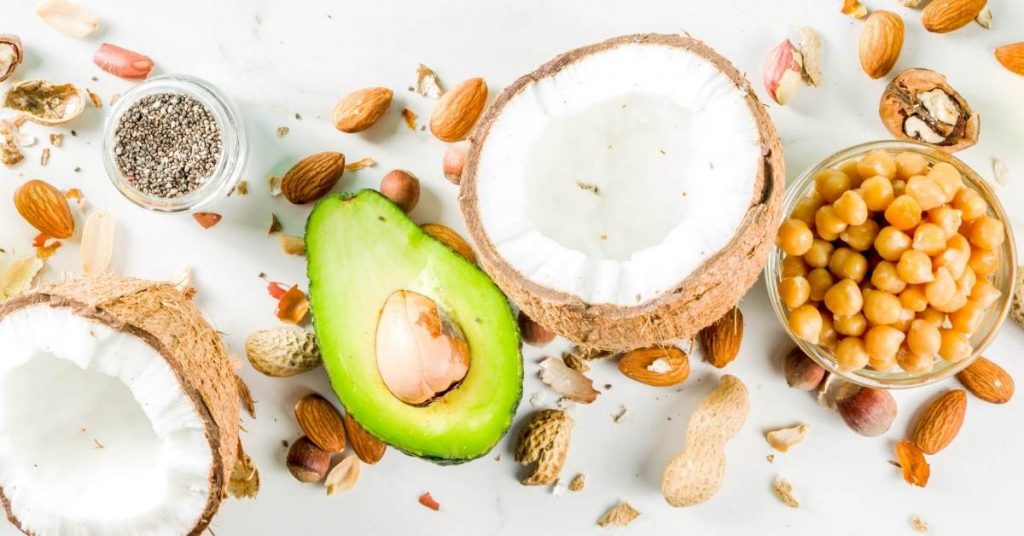What to eat for PCOS?
January 6, 2022 (1 Comment)
PCOS or Polycystic Ovarian Syndrome (or Disease) affects 10% of women in the child-bearing age. In a nutshell,
you have just been diagnosed with PCOS & are wondering….now what? This blog post is for you!
Understanding PCOS
The Rotterdam Criteria for PCOS requires you to have two of the following three conditions.
1. Irregular periods or No ovulation
2. Excessive presence of the male sex hormones, which can be diagnosed by a chemical test
3. Presence of polycystic ovaries on an ultrasound exam
Nutrition & lifestyle changes are one of the most effective ways to manage your PCOS…
Are you trying to conquer irregular periods, infertility, acne and excess hair growth on the body. Having experienced infertility myself, I understand your struggles and value the importance of using a personalized nutrition to help my clients manage their symptoms, using Intuitive Eating Principles.
Making healthy, conscious lifestyle choices can help you manage PCOS.
Is there a specific diet to follow?

Start with small dietary changes based on your needs
1. PCOS & CARBOHYDRATES
We know that about 75% of women with lean PCOS & 95% of women who are overweight with PCOS also have insulin resistance. Insulin is a hormone that is produced by your pancreas and its role is to help glucose get into the cells in your body so that the glucose can be used for energy.
The good news is, you don’t need to cut carbs completely from your diet.
Instead, avoid having large portion sizes of foods that are high in carbs in one sitting. It’s best to by spread out your carbohydrates out across the day. Not only is it important to build well balanced meals but including some lean protein such as chicken, fish, seafood, eggs or legumes, vegetables or a salad will make you feel satisfied and full!
The type of carbohydrates that you choose is also important. Choosing foods with a low Glycemic Index (GI) means that your body doesn’t have to produce large amounts of insulin quickly. Another bonus is that low GI carbohydrates are digested more slowly over a longer period of time.
Should I follow a low carb diet?
The answer is NO. Instead aim to consume foods with a low glycemic index (or low to moderate in carbohydrates). Low GI diets can help to support menstrual cycle regularity in women with PCOS.
Examples of foods to include:
• Wholegrain breads & cereals
• Sweet potato and potatoes
• Unsweetened yogurt (> 2% fat) with berries, and a touch of your favorite sweetener (honey or maple syrup)
• Whole fruit
• Quinoa
Swap white bread with a healthy side of quinoa salad, sweet potatoes, or bread made with sprouted grains
What about sweets:
You can still consume (enjoy) these sugary foods in moderation but try to limit soft drinks, store-bought muffins, sugary cereal bars and fruit juice as much as possible. There are many terrific recipes you can try to that sugar (sweet) craving, stay tuned on the bog for upcoming recipes.
The importance of ANTI-INFLAMMATORY FOODS FOR PCOS
2. You might want to try a Mediterranean diet (pattern) because it has been shown to improve inflammation, mood and fertility in women with PCOS. Another great benefit of this type of diet is that it can also help to reduce testosterone levels, which is responsible for symptoms such as acne and excess body hair.
3. Don’t forget the good old fashioned fibre. Foods that contain more fibre are rank high and they also slow down digestion and reduce the so called sugar spikes in the blood.
How can you boost your fibre intake?
• By eating more vegetables and also include cruciferous vegetables, like broccoli, cauliflower, and Brussels sprouts
• Leafy greens, including red leaf lettuce and arugula
• Beans and lentils
• Nuts and seeds
• Fruit
• Whole grains breads and pasta
What about PROTEIN: Include a source of protein (animal or plant) such as eggs, chicken eggs and fish at every meal.
Lean protein sources like tofu, chicken, and fish don’t provide fibre but are a very filling and nutritious choice for people with PCOS. Aim to consume “not ore than” two (2) servings or red meat and one meatless meal a week!
Incorporate exercise into your daily routine

Working from home has made us more sedentary then ever!
Exercise is an important part of managing PCOS! Exercise improves the way your body uses insulin and helps to keep the muscles in good shape! Also, “cysters” (aka women with PCOS) may experience mood disorders or have a higher risk of developing pre-diabetes. By staying more active you will reduce the risk of developing these conditions.
Has it been a while since your last workout? I know the feeling, dietitians struggle with that too! Just remember that every step counts! Why not take the stairs instead of the elevator the next time you go to the mall.
Aim for 30 minutes of moderate physical activity 3-5 days a week. Don’t forget to speak with your doctor for individualized advice regarding physical activity.
Set 30 minutes aside for brisk walking, yoga, or some low-impact body-weight activities. Other amazing exercises to manage PCOS include swimming, cycling, and pilates.
More helpful tips for “cysters” Living mindfully:
Mindfulness might sound complex but it really isn’t. Here’s my take on managing PCOS as a dietitian and infertility “warrior”!
1. Tune in to your body – learn how different foods, exercises, and sleep schedules affect your body and mind. For example – Do high-intensity workouts like cardio make your body ache and feel tired instantly?
2. Change your habits gradually- learn how by making slight changes to your eating and exercise habits and you will likely feel better. You can find
Sometimes, all you need is someone to point you in the right direction. I am, a registered dietitian who specializes in PCOS, infertility, and endometriosis. Achieving best health looks different for everyone because there is NO “one-size-fits-all approach managing your symptoms. My philosophy revolves around including more nutrient-dense, yet pleasurable foods in a way that is accessible and easy.
Contact me today for a one-on-one nutrition counselling session. I am based in Kingston, Ontario and can offer both, in-person and virtual counselling.
A small reminder from Louise. A high level of testosterone and androgen hormones, is easily detected with a simple blood test!